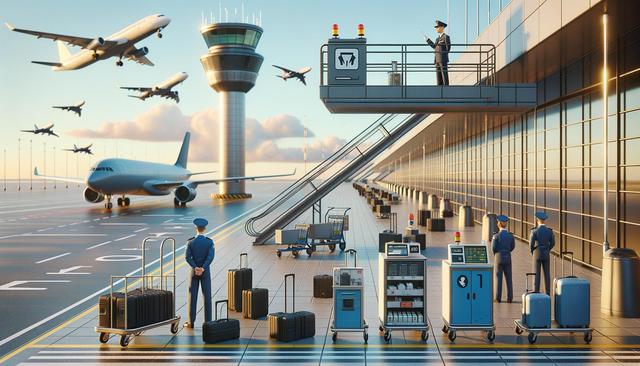Understanding the Scope of Airport Job Opportunities
Airports are dynamic workplaces that operate around the clock, offering a wide variety of job roles for individuals with different backgrounds and skill sets. Whether you’re interested in hands-on technical work, customer service, or behind-the-scenes operations, there are numerous airport job opportunities to explore. These positions range from entry-level to highly specialized roles, providing room for career growth and skill development. Some of the most common positions at airports include:
- Airport security personnel
- Customer service agents
- Aircraft maintenance technicians
- Air traffic controllers
- Baggage handlers
- Airport operations and management staff
Each of these roles plays a vital part in ensuring smooth and safe airport operations. With the increasing demand for air travel, the need for trained professionals continues to grow, making it a promising field for job seekers.
Technical and Mechanical Careers in Aviation
For those with a knack for mechanics or engineering, technical roles such as aircraft maintenance and aviation mechanics offer fulfilling career paths. These positions require specific training and certifications, but they are highly regarded for their critical role in safety and efficiency. Programs offering Aircraft Maintenance in {{location_state}} provide comprehensive education on aircraft systems, diagnostics, and repair techniques.
Additionally, aspiring aviation technicians can benefit from Aviation Mechanic Training in {{location_state}}, which equips them with the necessary skills to inspect and maintain aircraft components. These roles often involve collaboration with engineers and pilots to ensure aircraft are airworthy and adhere to regulatory standards. A few responsibilities in this field include:
- Conducting routine inspections and maintenance
- Repairing and replacing aircraft parts
- Keeping detailed maintenance records
- Complying with aviation safety regulations
With ongoing advancements in aircraft technology, there is a steady demand for skilled technicians who can keep up with the industry’s evolving needs.
Training and Education for Aviation Careers
Pursuing a career in airport operations or aviation management often begins with formal education and training. Enrolling in an Airport Management Course in {{location_state}} can be a strategic step toward understanding the logistical, financial, and regulatory aspects of running an airport. These courses typically cover topics such as airport planning, safety compliance, and passenger services.
In addition to management, safety is a top priority in aviation. Participating in Aviation Safety Training in {{location_city}} helps professionals understand risk management, emergency procedures, and regulatory compliance. Such training is essential for roles in operations, security, and emergency response teams.
The aviation industry values continuous learning, and many employers support ongoing education for their staff. Whether you’re just starting out or looking to advance, the right training can open doors to new opportunities and responsibilities within the airport environment.
Streamlining the Hiring Process: Onboarding and Integration
As airports expand and hire new talent, effective onboarding processes become increasingly important. Utilizing modern Onboarding Systems For New Employee in {{location_city}} ensures that new hires are integrated smoothly into their roles. These systems typically include digital platforms that manage tasks such as document submission, compliance training, and role-specific orientation.
Efficient onboarding not only enhances the employee experience but also helps maintain operational consistency at busy airport facilities. Some benefits of a structured onboarding process include:
- Faster time-to-productivity for new hires
- Improved retention and job satisfaction
- Clear communication of expectations and responsibilities
- Better alignment with organizational goals
For employers, investing in onboarding technology leads to more engaged employees who are better equipped to contribute to airport operations from day one.
Career Growth and Advancement Opportunities
One of the appealing aspects of working in aviation is the potential for long-term career growth. Entry-level roles at airports often serve as stepping stones to more advanced positions in operations, management, or specialized technical areas. For example, a baggage handler could pursue training to become an aircraft technician, while a customer service agent might advance into supervisory or administrative roles.
Many employers provide support for professional development through mentorship programs, certifications, and tuition reimbursement for courses such as Airport Management Course in {{location_state}} or Aviation Mechanic Training in {{location_state}}. Additionally, gaining practical experience in safety practices through Aviation Safety Training in {{location_city}} can prepare employees for leadership roles in safety and compliance departments.
With new technologies and evolving industry regulations, staying up-to-date with training and certifications is essential. Those who invest in their development often find themselves in positions with greater responsibility, higher pay, and more influence over airport operations.
Conclusion: Launch Your Aviation Career Today
Airport job opportunities span a wide range of roles and skill levels, offering something for nearly every career interest. Whether you’re passionate about mechanics, management, safety, or customer service, the aviation industry provides avenues for meaningful and rewarding work. With the right training—such as Aircraft Maintenance in {{location_state}}, Aviation Safety Training in {{location_city}}, or streamlined Onboarding Systems For New Employee in {{location_city}}—you can position yourself for success in this dynamic field. As air travel continues to grow, so will the need for skilled professionals ready to support safe and efficient airport operations. Now is a great time to explore your options and take the next step toward a fulfilling career in aviation.




Leave a Reply